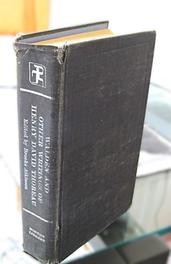After the retail craziness of last weekend, maybe it's time to slow down briefly and gain a little perspective on the moment, not to mention the next three weeks. Here's something you already know: indie bookshops are both the perfect resource for and refuge from the holiday season madness, with well-considered staff book recommendations, beautiful decorations inside and outside the stores, cozy atmospheres befitting of this time of year, and so much more.
 As British bookseller Afrori Books in Brighton and Hove put it earlier this week: "It's officially Christmas at Afrori! We've got some amazing things happening this month, from this evening's event with @cebocampbell to our Children's Christmas Party and New Year's Eve Celebration. But most importantly we're here to spread hope, joy, and continue to build community. So whatever your December looks like, come and spend a little bit of the Christmas season with us at Afrori Books."
As British bookseller Afrori Books in Brighton and Hove put it earlier this week: "It's officially Christmas at Afrori! We've got some amazing things happening this month, from this evening's event with @cebocampbell to our Children's Christmas Party and New Year's Eve Celebration. But most importantly we're here to spread hope, joy, and continue to build community. So whatever your December looks like, come and spend a little bit of the Christmas season with us at Afrori Books."
Something you also know: the best gift is a book, or many books, including some for yourself (even if you're a bookseller).
So, in some ways, the recent news that "brain rot" was named Oxford Word of the Year 2024 seems counter-intuitive to those of us who live in BookWorld. It's not that we don't spend more time than we should on our devices, but our major passion, the printed book, is decidedly offline.
Following a public vote in which more than 37,000 people participated, Oxford University Press reported that its language experts "created a shortlist of six words to reflect the moods and conversations that have helped shape the past year. After further public voting and conversation, they considered the public's input, voting results, and their own language data before declaring this year's winner."
According to OUP, "brain rot" is defined as "the supposed deterioration of a person's mental or intellectual state, especially viewed as the result of overconsumption of material (now particularly online content) considered to be trivial or unchallenging. Also: something characterized as likely to lead to such deterioration." The term increased in usage frequency by 230% between 2023 and 2024.
"Looking back at the Oxford Word of the Year over the past two decades, you can see society's growing preoccupation with how our virtual lives are evolving, the way Internet culture is permeating so much of who we are and what we talk about," said Casper Grathwohl, president of Oxford Languages. "Last year's winning word, 'rizz', was an interesting example of how language is increasingly formed, shaped, and shared within online communities. 'Brain rot' speaks to one of the perceived dangers of virtual life, and how we are using our free time. It feels like a rightful next chapter in the cultural conversation about humanity and technology."
 The first recorded use of "brain rot" was in Henry David Thoreau's classic book Walden, or Life in the Woods (1854), where he criticizes society's tendency to devalue complex ideas in favor of simple ones: "Why level downward to our dullest perception always, and praise that as common sense? The commonest sense is the sense of men asleep, which they express by snoring.... While England endeavors to cure the potato-rot, will not any endeavor to cure the brain-rot, which prevails so much more widely and fatally?"
The first recorded use of "brain rot" was in Henry David Thoreau's classic book Walden, or Life in the Woods (1854), where he criticizes society's tendency to devalue complex ideas in favor of simple ones: "Why level downward to our dullest perception always, and praise that as common sense? The commonest sense is the sense of men asleep, which they express by snoring.... While England endeavors to cure the potato-rot, will not any endeavor to cure the brain-rot, which prevails so much more widely and fatally?"
In 1866, a few years after Thoreau's death, his friend Ralph Waldo Emerson offered his take on a new technology's effect on the brains of his contemporaries: "I think the habit of writing by telegraph will have a happy effect on all writing by teaching condensation."
And in 1873, Harper's magazine observed: "When we consider the immense number of people that every day by writing a telegram and counting the words are taking a most efficient lesson in concise composition, we see in another way the influence of this invention on the strength of language."
Perspective is everything.
Ironically, the Guardian featured an online pop quiz: "Do you have 'brain rot' from endless social media? Try our quiz. As the Oxford word of the year for 2024 is announced, here are 12 questions to determine if you an overconsumer of mind-numbing online content."
In my paper-based world, I still have the battered old Modern Library edition of Walden and Other Writings of Henry David Thoreau that I purchased in the late 1960s. At the time, I was possessed by the Concord gang, and often visited Walden Pond to commune with my favorite ghosts.
Nearly every page of my copy of Walden is marked by underlined passages; I was an impressionable lad. The "brain-rot" sentence comes just a couple of paragraphs before one of Thoreau's much more famous lines ("If a man does not keep pace with his companions, perhaps it is because he hears a different drummer."). That one is no doubt featured on more than a few 2025 calendars in a shop near you.
 This year, I'm opting for a "bookish brain enhancement" December as an antidote to "brain rot." Maybe I'll even re-read Walden.
This year, I'm opting for a "bookish brain enhancement" December as an antidote to "brain rot." Maybe I'll even re-read Walden.
Indie booksellers, of course, prescribe the best antidote. For example, Bromleys Books, Marquette, Mich., just posted this to get patrons in a bookish holiday spirit: "Have yourself a literary Christmas! Countdown the 12 days of Christmas with our book adventure calendar, and open a new surprise book each day!... We can't wait to celebrate the season with you."

